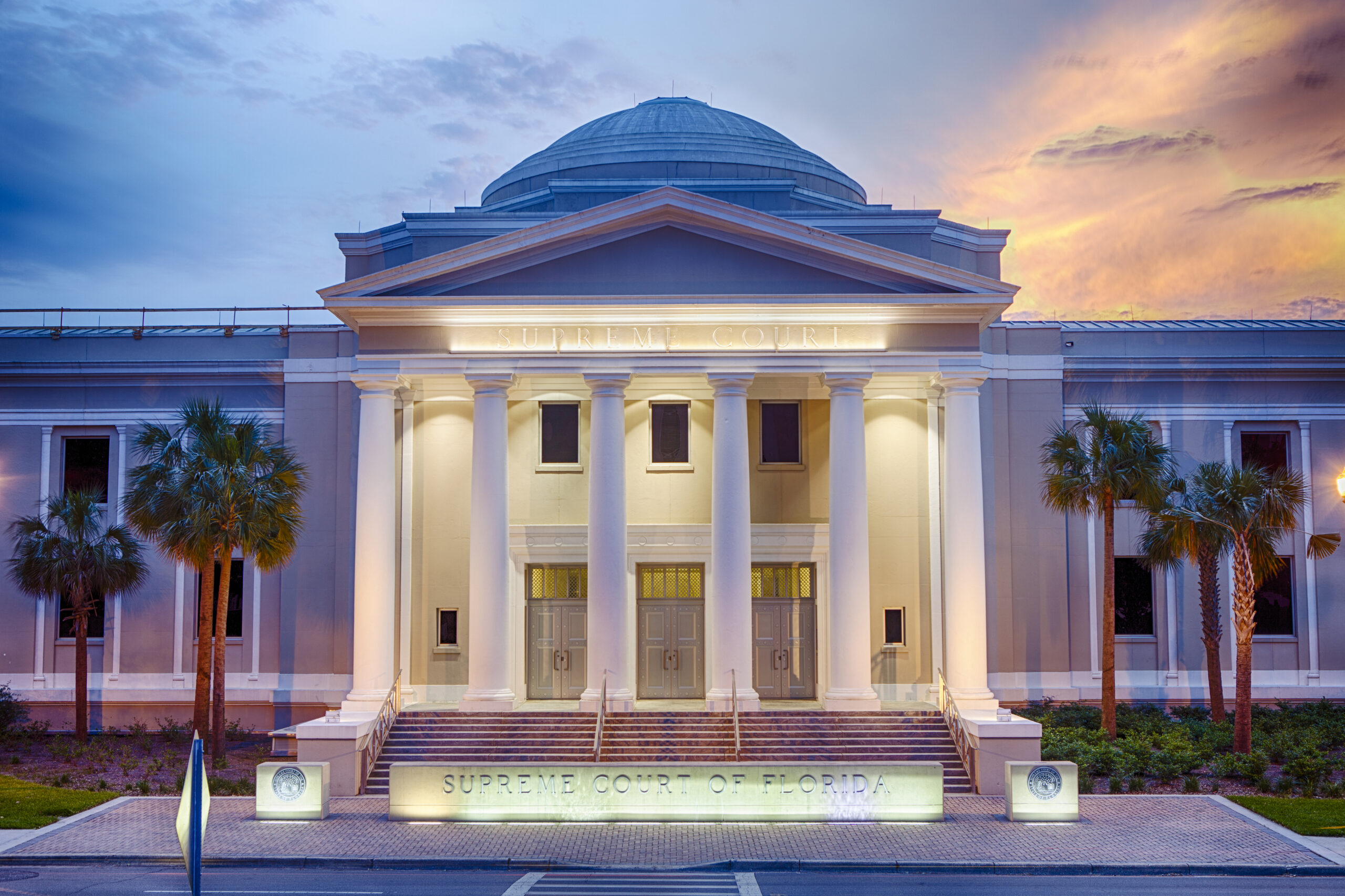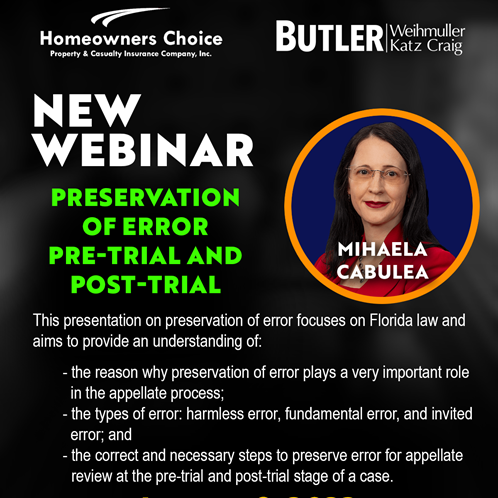
January 10, 2017
This article was originally published in the ABA Corporate Counsel Committee Newsletter, a publication by the American Bar Association, Fall/Winter, 2016. © Copyright 2016 by ABA. All rights reserved. Republished by Butler with permission from ABA.
Introduction
Errors will happen during litigation and at trial. They are simply inevitable. Many of them will be harmless. But when the error is harmful, a trial lawyer’s nightmare is finding out (too late) that the error was not preserved for appeal.
This is the first of a two-part article to assist trial lawyers and corporate clients with common preservation issues and pitfalls to avoid. The first part will cover preservation of error issues and principals that are generally applicable to most jurisdictions. More importantly, how an appellate specialist can assist trial lawyers at every stage of the proceedings including preserving errors for appeal. Your appeal truly does begin the moment a lawsuit is led.
And this brings us to part two. The second part will cover the selection of appellate counsel. Many clients know what they are looking for in their litigators and trial counsel. But how do you choose an appellate lawyer? Management and corporate counsel will share their insight and tips on selecting appellate counsel and creating a synergetic team with trial counsel. Candid interviewees will discuss the timing and other factors in determining when, why and how they chose to engage appellate counsel.
Failing To Timely Object Waives The Issue For Appeal (Most Of The Time)
No matter the jurisdiction, there are some generally applicable principles when it comes to appeals. Appellate courts are error correcting courts. A failure to object almost universally results in an error not being preserved. Sometimes, the failure to object is a tactical decision. But too often the unpreserved error was not a “strategy call,” and discovered for the first time only after an adverse judgment is entered. An appellate lawyer can help ensure that this is a deliberate process rather than an unintentional oversight.
An objection may be required at various stages of the litigation to preserve error – the pleading stage, pretrial discovery, motion practice, trial and post-trial. An appellate lawyer can tell you when, how, and why the objection needs to be made. Finally, keep in mind that your jurisdiction may require an actual ruling on the objection to preserve the issue for appeal. An objection may not be sufficient
For example, at the pleading stage, many jurisdictions require certain defenses be pled in the initial responsive pleading to preserve the issue on appeal.1 In some jurisdictions, a claim for attorney’s fees must be pled in the complaint or answer or it is waived. But if this objection is not raised in opposition to a motion seeking fees, then this objection is waived.2 A challenge that the complaint fails to state a cause of action typically must be presented by a motion to dismiss. Otherwise, it is waived. And the list goes on.
Pretrial discovery can bring its own special challenges and times when an appellate specialist may assist trial counsel. In Florida, discovery orders compelling the production of confidential or privileged information may be immediately challenged by filing a petition for writ of certiorari with the appellate court.3 Other states have similar remedies.4 Appellate counsel familiar with the jurisdiction can readily determine if an appellate remedy is available.
Some pretrial orders are immediately appealable or can be appealed at the conclusion of the case. Certain orders must be immediately appealed or the right to appeal is forever lost. Again, an appellate specialist can let you know – before it is too late – the orders that need to be appealed immediately.
Appellate Counsel At Trial – An Indispensible Ally
The need for an appellate specialist probably becomes most apparent at trial. Seasoned trial counsel often welcome an appellate lawyer to the team at the trial, or even pretrial, stage. Because they know that the pretrial and trial stages are fraught with preservation traps for the unwary (or distracted). By having an appellate lawyer on hand, the trial lawyers can focus on the meat of preparing and winning their case.
At the pretrial stage, appellate lawyers often assist with evidentiary issues and particularly, motions in limine. Once a definitive ruling is obtained on a motion in limine to admit or exclude evidence, some jurisdictions do not require a renewed objection at trial.5 Others do. Typically, when evidence is excluded, many jurisdictions require that a proffer of the evidence be made in order to preserve the issue for appeal.6
Selecting a jury is another area where errors can go unpreserved. Knowing the rules for peremptory and cause challenges is essential. It is not uncommon for jury selection issues to go unpreserved because the required objections to the panel were not made at the appropriate time (or at all). An appellate specialist partnered with trial counsel to select and empanel the jury will ensure that timely and sufficient objections are made.
Making A Better Record (From The Appellate Court’s Perspective)
Once the case is on appeal, the appellate record “is what it is.” It is a fundamental principle that appellate courts are “error correcting” courts. The appellate court will not consider facts and evidence not in the record. And new arguments on appeal are universally “frowned upon.” In some jurisdictions, they are grounds for sanctions. All the more reason to involve appellate counsel sooner rather than later to ensure the record – if there is an appeal – will be the best possible record to support affirming or reversing the final judgment.
Well, Should You Appeal? An Appellate Lawyer Provides Perspective
After a lengthy, exhausting jury trial, the verdict is not in your client’s favor (or even close). Of course, the immediate instinct is to appeal, right? But the decision to appeal will need to be evaluated realistically, not emotionally, in consideration of the prospects for a successful appeal. And here is where the appellate specialist may prove most valuable to you and your shared client. He or she will temper the disappointment of the loss with the reality of the appeal. The intricacies and nuances of harmless v. harmful error; the standards of review to be applied; and the nature and significance of the errors will no doubt factor into appellate counsel’s evaluation of the likelihood of success. Even where the odds are slim, the decision to appeal may be made. But at least it will be made with a fresh and objective perspective provided by consulting with appellate counsel.
Ok, Sounds Good, But What About The Expense?
A corporation’s litigation budget may be determined by the type of case, the jurisdiction and many other factors. Some budgets already factor in a possible appeal. Other budgets may not include appellate counsel’s involvement at the pretrial or motion stage. Each company ultimately decides according to its own particular needs, case load and risk tolerance. The expense of appellate counsel is the ultimate risk/ benefit analysis. Prevailing at trial is not a really a victory if the verdict is reversed on appeal because of harmful error inadvertently made. And neither is an affirmance of a final judgment because of unpreserved error.
Can you really afford not to? Interviewees in Part Two will answer this question (and others). Stay tuned…
- Pennsylvania, Indiana and Florida are just a few of the jurisdictions with such a rule. See Matthews v. Malloy, 272 A.2d 226 (Pa. Super. Ct. 1970); City of Hammond, Lake Cnty. v. N. Indiana Pub. Serv. Co., 506 N.E.2d 49 (Ind. Ct. App. 1987); Goldberger v. Regency Highland Condo. Ass’n, Inc., 452 So. 2d 583 (Fla. Dist. Ct. App. 1984).
- This remains the rule in Florida. See Stockman v. Downs, 573 So. 2d 835 (Fla. 1991).
- See Gosman v. Luzinski, 937 So. 2d 293 (Fla. Dist. Ct. App. 2006) (finding certiorari review is proper when discovery order compels the production of privileged materials). For example, in Texas, the remedy is via petition for a writ of mandamus. See D.N.S. v. Schattman, 937 S.W.2d 151 (Tex. App. 1997) (noting writ of mandamus is proper vehicle to attack order granting or denying discovery).
- This is the law in Florida. See Powell v. State, 79 So. 3d 921 (Fla. Dist. Ct. App. 2012).
- Kansas is such a jurisdiction. See Brunett v. Albrecht, 810 P.2d 276 (Kan. 1991) (ruling when motion in limine has been granted, it is the responsibility of party being limited to proffer sufficient evidence to trial court to preserve issue for appeal).



